In Europe 40% of the adult population is overweight or obese (The Lancet, 2017) with an increasing trend in developed countries. These pathologies are associated with bad eating habits and sedentary lifestyles (Mozaffarian, 2014). Different generations are facing different issues: children that are overweight who may become obese adults, young people with eating disorders are more sensitive to health problems. Researchers agree (Álvarez et al, 2022): there is a correlation between social class and health. Populations in situations of social vulnerability are more prone to nutritional imbalances and health problems. UNEAT is a higher educational institution with international projection. Its campus is located in Santander (Northern Spain, 14 500 students). Its Faculty of Health is leading the European project “E+Dieting-lab” (Digital Lab for Education in Dietetics combining Experiential Learning and Community Service, Erasmus +, 2022-2025) focus on nutritional education for underserved communities. The main objective is to increase the health of local communities by promoting better nutritional resources and healthy habits. The project involves 6 European partners from Belgium, Austria, Poland, Portugal and Spain and concretes the third mission of the university: its social responsibility, developing the figure of community dietitian. Universities must respond to its social commitment by contributing to solve community problems and reach sustainable development goals. Connected to the community-Service approach, E+DIETing_LAB developed a digital platform for facilitating the contact between nutritionists and communities giving to people the access to recommendations and good practices in dietetics. Recognizing the implications of diet in health, this initiative is currently working to produce healthy changes in communities among 840 adult individuals associated with different target groups: older people, young students, civil associates, and social administration users. Patients may be somewhat overweight, or feel sedentary, etc. Their particular group must be considered as a beneficiary community by the university.

4th PLACE
EDI Community Engagement Initiative of the Year Award
E+Dieting_lab
4th PLACE EDI Community Engagement Initiative of the Year Award
Peoples' Choice Category Winner
European University of The Atlantic - Spain
"E+Dieting_lab. DIGITAL LAB for education in dietetics"

Summary
Key People
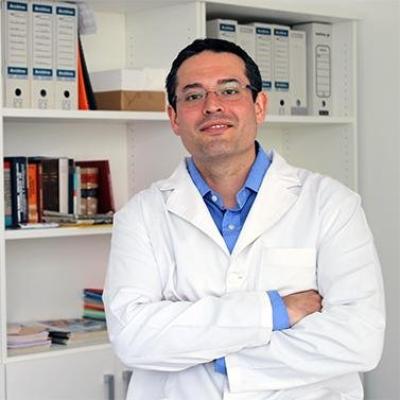
Iñaki Elío Pascual
RESEARCHER AND PROJECT MANAGER
Faculty of Health Sciences,
EUROPEAN UNIVERSITY OF THE ATLANTIC
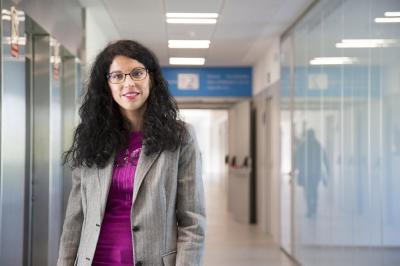
Sandra Sumalla
RESEARCHER
Faculty of Health Sciences,
EUROPEAN UNIVERSITY OF THE ATLANTIC
Acknowledgements
We would like to thank you for their support and activity:
- CONICUDAN (Professional College of Dietist-Nutritionist of Cantabria)
- The Spanish Academy of Nutrition and Dietetics
- The Iberoamerican University Foundation FUNIBER
- The Portuguese Ministry of Health -
-The Portuguese Council of Nutritionists
- The Portuguese Association of Nutrition (APN).
- The Femish Association of Dietitians
- The Polish Telemedicine Society
- The Polish Society of Public Health
- The University of Applied Sciences in Bern, Switzerland,
- The Austrian Agency for Health and Food Safety
- The European Federation of the Association of Dietitians (EFAD).
- The European Network of Dietetic Students (ENDietS).
- The International Confederation of Dietetic Associations (ICDA)
- The Education and Lifelong Learning Committee (ELLLC)
Images
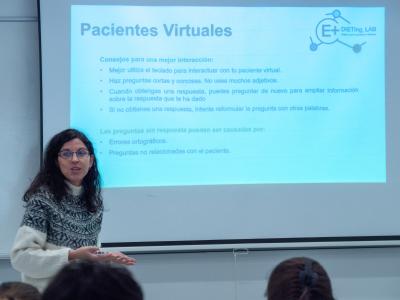
Presenting the project
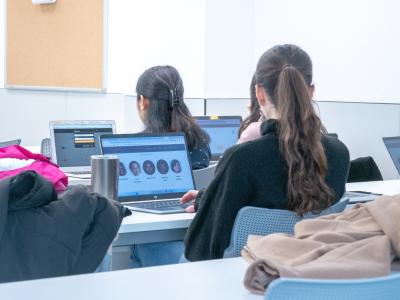
Students participating in Pilots
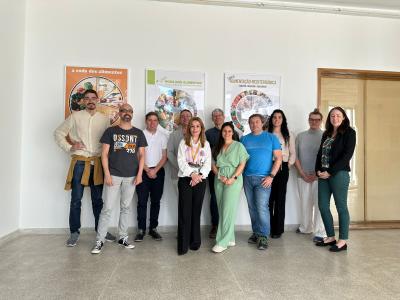
DietingLab team
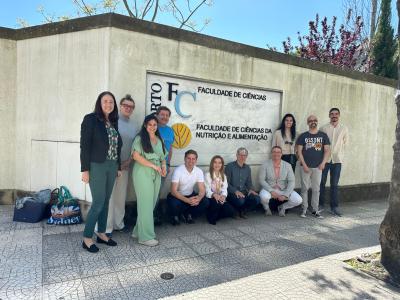
DietingLab team in Oporto University
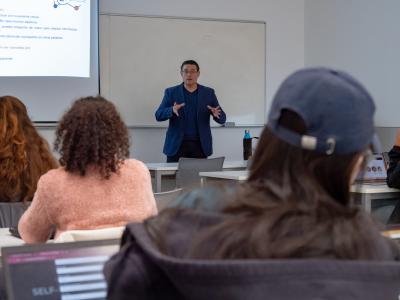
Presenting the project to community
IMPACT STORY
Impacting lifes
The main benefit of this project is related to community health. The digital platform allows professional nutritionists, advanced dietetic students and patients from defined vulnerable groups to connect. The authors agree (Álvarez et al, 2022): there is a correlation between social class and health, vulnerable populations are more prone to nutritional imbalances and health problems. In Europe 40% of the adult population is overweight or obese, and worldwide there are more than 2.1 billion people who are overweight (The Lancet, 2017) with an increasing trend in developed countries. Those trends are associated with bad eating habits and sedentary lifestyles (Mozaffarian, 2014). Different generations are facing different issues: overweight children who may become obese adults, young people with eating disorders.
Thanks to the project approach, E+DIETing_LAB developed a digital platform for facilitating contact between nutritionists and communities giving people access to recommendations and good practices in dietetics.
According to the implications of diet in health, this initiative is producing currently healthy changes in the communities, currently among 840 adult individuals associated into a particular targeted group: older people, young students, civil associations, social administration users.
Patients may be somewhat overweight, or feel sedentary, etc. Their particular group must be considered as beneficiary community for the university.
Measurable outcomes are:
NUMBER OF PARTICIPANTS from the local communities (after the project)
USER OF PROJECT RESULTS
(year 1 after the project) USERS OF PROJECT RESULT: 2.940
(year 2 after the project) USERS OF PROJECT RESULTS: 3.717
(year 3 after the project) USERS OF PROJECT RESULTS: 4.227
Project leaders developed a dashboard in order to control community participation and, in case of need, improve project dissemination. They built clear indicators for short- and long-term sustainability, based on a final questionnaire (after the online sessions) :
Short term
-Community members increase their level of awareness in healthy habits >70%
- Community members start some new healthy habit related to the diet >60%
Long term
- Community members improve some health indicator in less than 4 months >50%
LEARNINGS
Lessons learned
The project pursues long term impact by providing to Universities and European stakeholders from the health system a digital platform for community nutrition in order to spread the practical knowledge on dietetics. This Project approach is recognized by the European Union, and focuses on two original aspects:
1. Community-service for social commitment:
Project’s proposal is incorporating a social-pedagogy model referred as Community Service or Service-learning in order to link learning with social commitment and civic engagement within the community. It is necessary to give protagonist to the third mission of the University: its social responsibility related to solve community problems and promote students’ social commitment, and at the same time, train future professionals through experiential learning practices: doing a service to the community. Helping others, is one of the most effective learning methods (Battle, 2011).
2. Artificial Intelligence for the digital platform development
The platform is developed to improve learning outcomes through iteration of learners with patients deploying social initiatives of Community Service from the training centres to the community. The technological development applies Artificial Intelligence, as a valuable technique for the detection of a user’s common behaviours and patterns. Besides, the application of AI – e.g unsupervised learning - should capture relevant data on real issues concerning interactions between future dietitians and patients, such as the building of trust between parties or the mechanisms that improve the adherence of individuals to long-term diets and new healthy habits.
E+DIETing_LAB model is promoting healthy habits in European communities thanks to technological development and project’s products are also interesting institutions connected to healthy habits as Medicine, Nursing or Sports.
FUTURE PLANS
What's coming?
In order to reach the sustainability goal of the project, project defined a sustainability plan focused on five main aspects:
1. E+DIETing_LAB COMMUNITY: creation of a network of professionals focused in human nutrition with different backgrounds and status (private/public, academia/companies). Project team’s ambition is to maintain an active community, from the seed of this project (expected to reach a database of 760 participants). We should be able to foster cross fertilization of ideas across the EU and beyond and work in new projects. The project aims at maintaining this community after the end of the project and it will be catalysed by the appointed contact person due to the project’ leader.
2. EDUCATIONAL PROGRAMMES: The 6 full partners (PÖL, UJK, UNEAT, Uva, UPORTO, and AP) and the 27 associated partners in Europe will implement the Results directly into their education programmes with a recognition of 2 ECTS in each HEI related to the practical training.
3. DIGITAL PLATFORM: the online platform will host all open educational resources of the project and will be used to attract new stakeholders. All E+DIETing_LAB resources will be available (at least) after 3 years of the end of the project.
4. COMMUNICATION CHANNELS: Updated information through opt-in database mailing, website and social media. The E+DIETing_LAB project will make use of the Electronic Platform for Adult Learning in Europe (EPALE) platform as a means to achieve better dissemination and improve end-user participation.
5. SCIENTIFIC RESEARCH: To date, a scientific article has been published in the Journal of Medical Systems, on the state of the art of the proposed technological-scientific development. The journal is of quartile 1, impact 5.82 (Springer publishing house, USA). The article has provided high visibility to the project in the scientific field.
Ferreras, A., Sumalla-Cano, S., Martínez-Licort, R., Elío, I., Tutusaus, K., Prola, T., Vidal-Mazón, J.L., Sahelices, B., De la Torre Díez, I. (2023) Systematic Review of Machine Learning applied to the Prediction of Obesity and Overweight. Journal of Medical Systems, 47:8. https://doi.org/10.1007/s10916-022-01904-1

